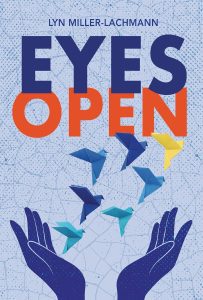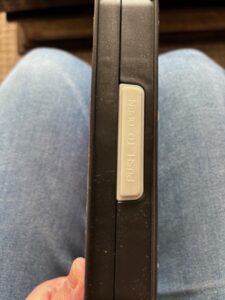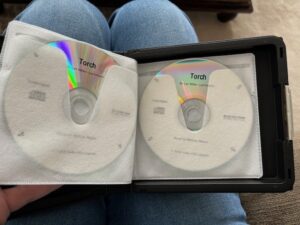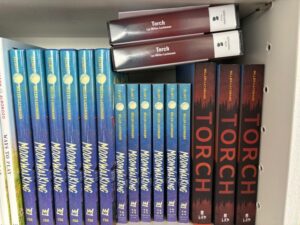Audiobook News!
When Rogue was published in 2013, people asked if they could listen to it on audiobook. In those days, this format was just beginning to take off in popularity, and the hardcover went out of print without an audio edition. That meant readers with various types of disabilities did not have access to this story, one of the first with an autistic protagonist written by an autistic author.
 Since then, four of my published books and one of my translations have come out in audio editions, and I am pleased to announce that there will be another! I just found out that Eyes Open will have an audiobook released around the same time. Tantor Media, which produced the audio edition of Torch, will also produce the reading of Eyes Open. My reader is Soneela Nankani, winner of multiple awards for her performances.
Since then, four of my published books and one of my translations have come out in audio editions, and I am pleased to announce that there will be another! I just found out that Eyes Open will have an audiobook released around the same time. Tantor Media, which produced the audio edition of Torch, will also produce the reading of Eyes Open. My reader is Soneela Nankani, winner of multiple awards for her performances.
I am especially thrilled for the audiobook of Eyes Open because the novel is meant to be read aloud. It’s a verse novel about a girl finding her voice under a repressive theocratic government, and her performance of one of her poems is a climactic moment in the story. (Teaser: The live reading doesn’t take place in a coffeehouse.) I know Soneela will capture Sónia’s passion and the rhythm of her poems inspired by the music of her world — Portuguese fado that is at the center of her family and country’s history, and the officially-disapproved Beatles albums that are nonetheless available to a privileged elite.
Having audiobook editions of She Persisted: Temple Grandin, Moonwalking, Torch, Ways to Play, and Pardalita has introduced me to new aspects of publishing. For the first two books, my editors asked me to weigh in on the readers who auditioned for the projects. Zetta and I had a Zoom meeting with Michael Crouch and Caz Harleaux, the voices of JJ and Pie respectively, to discuss aspects of that verse novel with them and answer their questions. I’m impressed by the amount of work these readers put in to get the pronunciations right, especially for books with words and names that aren’t in English. The readers of my books have had to speak a bit of Spanish, Polish, Czech, Slovak, German, French, and, of course, Portuguese as well as English. And with the Spanish and Portuguese, it had to be specific to the backgrounds of the characters — in the case of Moonwalking, Puerto Rican, and in the case of Pardalita and Eyes Open, European as opposed to Brazilian Portuguese. Pardalita represents the audiobook debut of Levine Querido editor Irene Vázquez, who is herself a poet.
Aside from meeting Michael and Caz (and hearing from Irene that she would be reading Pardalita), my biggest audiobook thrill was discovering that Torch was not only a digital audiobook; it had gone into physical copies — both audio CDs and mp3 CDs. I heard that Melissa Moran had done an outstanding job with a difficult book (difficult in terms of both multiple POVs and Czech and Slovak names and words), and the presence of these physical copies testifies to the appreciation listeners have had for these books. I recently received two copies from the producer, elaborately gift-wrapped, and I am so appreciative of the time and care that Tantor Media has put into this production.
I must admit that I don’t listen to audiobooks. I don’t have a car, and when I’m walking around, I need to be able to hear cars and people for safety reasons. When I’m at home working, I prefer listening to music. So having audiobooks out in the world has been a new experience for me, and I’ve had to find the answers to several questions I had about the format, such as:
Why are covers redesigned, sometimes drastically, as in the case of Torch? Mainly it’s because they’re different dimensions, more square than physical books. That’s not an issue for digital audiobooks, but when physical copies in CD form are manufactured, they are a different size.
How do you make an audiobook of a graphic novel or picture book? Most of the time, the audiobook edition has a digital file of the print version so listeners can see the illustrations and the placement of the text. This is also helpful for poetry and verse novels. For instance, Moonwalking has several concrete poems, poems in which the arrangement of letters, words, and lines relates to the theme of the poem. (See the poem “Genius” as an example.)
Does anyone really play CDs anymore? I do. I’ve had my stereo system for about 30 years, and it allows me to party like it’s 1995. There are advantages of physical media, including the fact that the recordings don’t go “poof” if you don’t pay an exorbitant subscription to a streaming service, the internet or your own computer goes down, or a repressive government decides to crack down on content it doesn’t like. As governments and corporations become more intrusive, legacy media not connected to the internet can serve as a source of freedom and resistance, like the hand-written or typed manifestos known as samizdat under Communist regimes. In addition, libraries still lend audio and mp3 CDs, which is where most of these physical copies are currently sold.
If you have any questions about audiobooks, want to correct any misconceptions I’ve spread in this post, or want to share your own experiences, I look forward to your comments.











